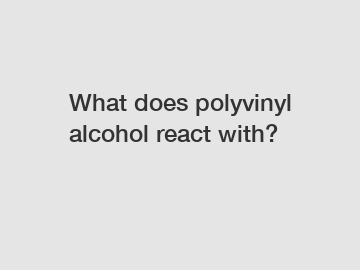Apr. 06, 2024
Agriculture
Polyvinyl alcohol, also known as PVOH or PVA, is a versatile polymer that is commonly used in a wide range of applications, from adhesives and coatings to textile sizing and packaging materials. One of the key features of polyvinyl alcohol is its ability to react with various chemicals and compounds, allowing for the creation of new materials with unique properties. In this blog post, we will explore some of the main reactions that polyvinyl alcohol can undergo, and the applications that arise from these reactions.
One of the most common reactions that polyvinyl alcohol can undergo is esterification, in which the hydroxyl groups on the polymer chain react with carboxylic acids to form ester linkages. This reaction can be catalyzed by acid catalysts, such as sulfuric acid or boron trifluoride, and can result in the formation of polyvinyl acetate, a widely used polymer in adhesives and coatings. Esterification of polyvinyl alcohol can also be used to create crosslinked networks, which can improve the mechanical properties and water resistance of the material.
Polyvinyl alcohol can also undergo etherification reactions, in which the hydroxyl groups on the polymer chain react with alkyl or aryl halides to form ether linkages. This reaction can be catalyzed by strong bases, such as sodium hydroxide or potassium hydroxide, and can result in the formation of polyvinyl ethers. These ethers can be further functionalized with other groups, such as amino or carboxylic acid groups, to introduce new functionalities into the polymer chain. Polyvinyl ethers are used in a variety of applications, including as thickeners in aqueous solutions and as compatibilizers in polymer blends.

Another important reaction that polyvinyl alcohol can undergo is acetalization, in which the hydroxyl groups on the polymer chain react with aldehydes or ketones to form acetal linkages. This reaction can be catalyzed by acid catalysts, such as hydrochloric acid or p-toluenesulfonic acid, and can result in the formation of polyvinyl acetals. Polyvinyl acetals are commonly used as barrier coatings in packaging materials, as they provide excellent resistance to moisture and oxygen permeation.
In addition to these reactions, polyvinyl alcohol can also undergo oxidation reactions, in which the polymer chain is functionalized with carbonyl or carboxylic acid groups. This can be achieved through the use of oxidizing agents, such as sodium hypochlorite or potassium permanganate, and can result in the formation of polyvinyl aldehydes or polyvinyl acids. These oxidized forms of polyvinyl alcohol can exhibit enhanced adhesion properties, making them useful in applications such as surface coatings and adhesives.
Overall, the ability of polyvinyl alcohol to react with a variety of chemicals and compounds makes it a versatile and valuable material in the field of polymer chemistry. By controlling the conditions of the reactions, such as the type of catalyst or the reaction temperature, it is possible to tailor the properties of the resulting polymers to suit specific applications. The ability of polyvinyl alcohol to form ester, ether, acetal, and oxidized derivatives allows for a wide range of functionalizations, making it an attractive choice for many industrial applications.
In conclusion, polyvinyl alcohol is a highly reactive polymer that can undergo a variety of chemical reactions to form new materials with unique properties. From esterification and etherification to acetalization and oxidation, the versatility of polyvinyl alcohol makes it a valuable material in a wide range of applications. By understanding and controlling the reactions that polyvinyl alcohol can undergo, scientists and engineers can create innovative materials that meet the evolving needs of society.
For more information, please visit pva glue powder exporter, mortar retarder manufacturer, steel fiber exporter.
Previous: What is the price of SSP fertilizer 50 kg?
Next: Top 5 Reasons Why Custom Outdoor Furniture Covers Are Essential
If you are interested in sending in a Guest Blogger Submission,welcome to write for us!
All Comments ( 0 )